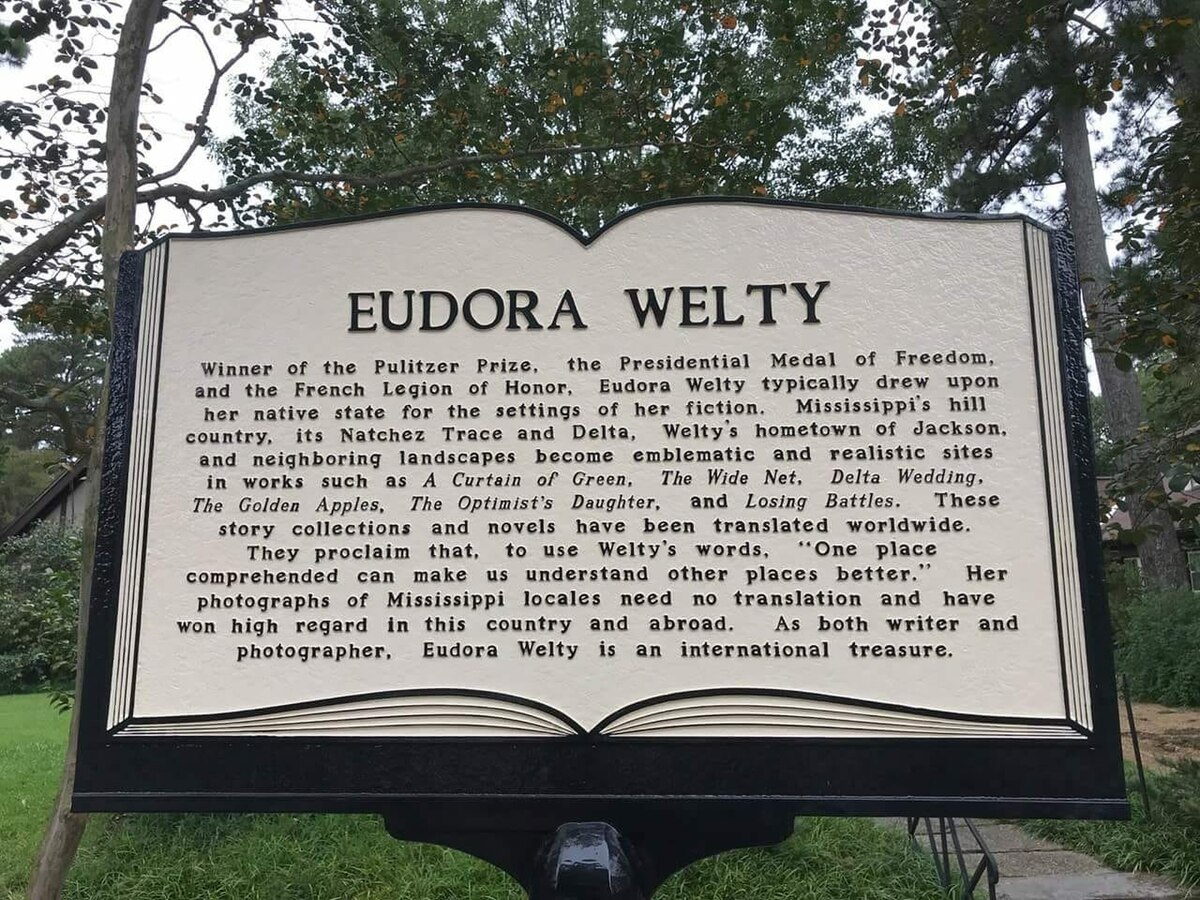Eudora Welty was born on April 13, 1909, and in honor of her birthday this weekend, the Editors and Associate Editors of the Eudora Welty Review took some time to reflect with Penn Press on the journal, Welty’s present-day import, and where they see the EWR moving in years to come. Their answers reveal the longstanding import of the artist that anchors the journal—a voice of and before her time—and a steadfast commitment to publishing a diverse range of scholarship that spans from traditional essays to pedagogy and engagement pieces to digital humanities.
Sarah Gilbreath Ford and Rebecca L. Harrison are the current editors of the EWR. They have served on the editorial team together since fall of 2021. Associate editors Mae Miller Claxton and Michael Pickard joined the staff in fall of 2023; issue 16 will be their first with the journal.
How does Welty’s work still resonate today?
Mae Miller Claxton: Interestingly, while the southern literature “canon” has changed over the years, becoming more global in scope, Welty’s writing continues to be read productively from many different perspectives. Changes in theoretical perspectives have only made reading her work richer. Also, I continue to be surprised by her popularity among writers.
Sarah Gilbreath Ford: I love Mae’s attention to new and different perspectives. I think Welty’s work still resonates today in its exploration of the complicated relationships between people and between people and their environments (social, cultural, natural). My students easily recognize in Welty’s stories the struggles of sibling rivalry, the possible tensions between parents and children, or the hurt of romantic relationships gone awry. In exploring different viewpoints, Welty explains, “what I do in writing of any character is to try to enter into the mind, heart, and skin of a human being who is not myself. Whether this happens to be a man or a woman, old or young, with skin black or white, the primary challenge lies in making the jump itself.” Welty deftly executes this jump, so that readers can see how different people react to interpersonal situations, allowing them that privilege afforded by fiction of living many lives.
Her work also resonates in its evocation of how people exist in environments that impact their decisions and agency. A small town in 1940s Mississippi might feel alien at first to a twenty-first century reader, especially with its different gender and racial paradigms, yet the experience of being part of a community that both supports and negates an individual’s identity still speaks to readers.
Rebecca L. Harrison: I couldn’t agree more with Mae and Sarah. My twenty-first century students gravitate more and more toward the tenets of postcolonial, gender, and disability theory. In Welty, they find access points for these interests that challenge them in ways that other writers of the period do not. Whether examining the residual consequence of colonization across the Natchez Trace in The Wide Net and Other Stories or The Robber Bridegroom or mythology and gender politics in The Golden Apples or Eugenics in the South in “Lily Daw and the Three Ladies,” Welty’s work allows them to carve out still to be explored spaces for their own critical investigations. Her work also facilitates spaces for them to discuss contemporary issues relevant to their lives. I am still taken aback, for example, at how “The Purple Hat,” a story that often puzzled my students ten years ago, now generates the most engagement in my classes in the wake of the Me Too movement.
And, let’s be clear. Welty is hard—in the most exciting and wonderful of ways. That is exactly what draws me back in time and again as a reader. I am always left baffled or intrigued by something new and different in Welty’s world. You never just finish a Welty text by turning a final page and putting the book away. The tensions she creates and does not resolve incite an infectious curiosity any nuanced reader has to address.
How has the field of Eudora Welty scholarship evolved over your careers?
Mae: In the course of my own career, I was taught New Critical readings. Today, we are reading her work with every theoretical lens that exists. We are also taking her writing to other countries and applying a global lens to her works.
Sarah: As Mae notes, earlier scholarship did the foundational work of close reading, unpacking allusions, and making historical connections. The evolution comes as we are able to build off this foundation to generate new readings. In the last couple of decades, those readings have focused on gender and race. More recently, critics are reading her work through ecocriticism, material studies, and disability studies. Also of note are new discoveries in the Welty archives that teach us about her relationships to her family, editors, or other writers.
Rebecca: In addition to the new theoretical perspectives and archival work that my EWR colleagues already speak to—innovations that have generated new generations of game changing Welty scholarship over the years—I have personally really enjoyed watching our understanding of the author’s daily life, and its inevitable influence on her work (and, in turn, her work on the world) evolve. Concerning the EWR’s role in that evolution, we have always been committed to contributor discoveries spotlighted in our “Interview” and “Notes” sections. There readers discover delightful tidbits such as what Welty’s life was like when she attended Camp Nakanawa as a teenager (issue 14) to how later, as a noted author, she became part of Charles Schulz’s tapestry in his Peanuts series (issue 16, forthcoming). These smaller bites on Welty’s life, writing, and influence texture the bigger scholarly brushstrokes, in my estimation, and, often, spearhead new investigations or ways to reframe existing discussions.
What can readers expect from the Eudora Welty Review in the years to come?
Mae: Readers of the EWR can expect to read cutting-edge scholarship but also information about the popular Eudora Welty Book Club and events at the Eudora Welty House and Garden. The Welty community is truly large and diverse. The one thing we all have in common is a devotion to what Welty’s writings can teach us about the human experience.
Michael Pickard: In addition to Mae’s points, the EWR will, like academic journals everywhere, grapple with the implications of the digital turn and generative AI. We are quite interested in scholarship that explores these new technologies and how they can inform and transform our understanding of Welty’s writings. Instead of resisting these technologies, we want to leverage them as part of our ongoing effort to curate innovative scholarship and textual engagement.
Sarah: Readers can continue to expect academic essays that explicate Welty’s work, but we will also be including other innovative forms of response, such as shorter reflection pieces that cover a narrower topic, digital humanities projects as Michael notes, and pedagogical essays.
Rebecca: As a single author journal, we also hope to foster more interdisciplinarity in approaching Welty’s imaginary. We would love to see more scholars from areas outside of the modern South examine and elevate our understanding of Welty’s engagement with history, art, classics, genre, etc. And, expect even more targeted engagement with and opportunities for young scholars. With the national shrinkage in spaces for Humanities work, our journal remains committed to providing a platform for the next generation of voices. Finally, I’m really excited about our editorial team. Mae and Michael came on board recently and have brought fresh perspectives that I’m convinced will help us transition the journal to places we haven’t even envisioned yet.
Are there particular articles you would recommend for course adoption?
For teachers wanting to incorporate digital humanities into their classrooms, this essay could spark ideas:
- “Welty’s Digital Future, Some New Directions” by Michael Pickard in Volume 14, 2022.
Are there other articles you’d like to highlight?
These essays illustrate some of the new approaches the review is publishing.
- An example of ecocriticism: “‘It was said she believed in evolution’: Ecogothic Time and Space in Eudora Welty’s ‘Moon Lake’” by Grace Perry McCright in Volume 15, 2023.
- An example of material culture: “‘A Lady Couldn’t Expect to Travel without a Hat’: Cultural Capital, Gender, and Sexuality in Welty’s Short Fiction” by Laura Sloan Patterson in Volume 12, 2020.
- An example of media studies: “‘That’s me’: Ruby Fisher from ‘A Piece of News’ as Eudora Welty’s Selfie” by Katie Berry Frye in Volume 15, 2023.

